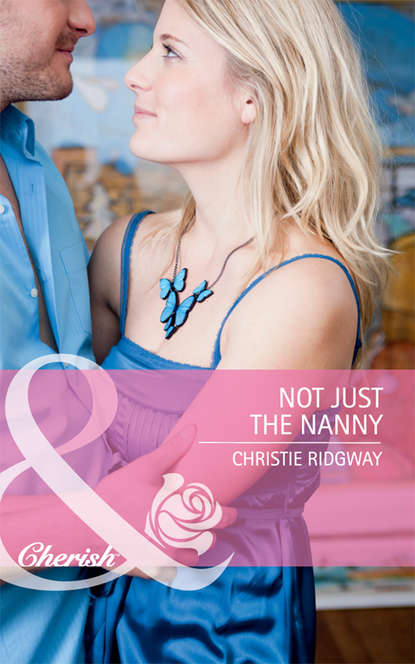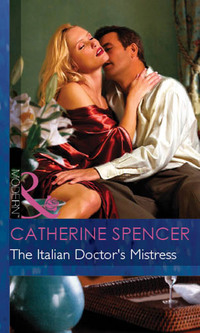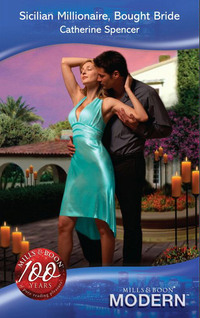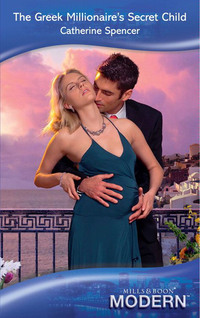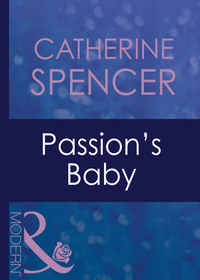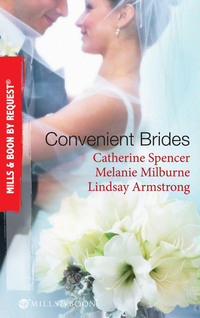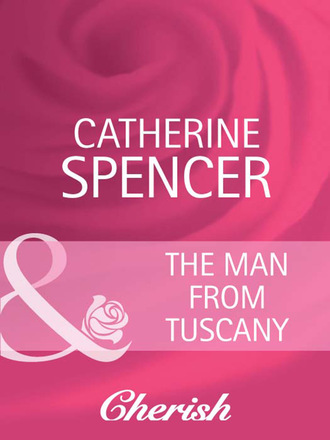
Полная версия
The Man from Tuscany
For a moment, I was tempted to tell her that I had, and it was fatal—that I’d fallen desperately in love with a handsome Italian and was heartsick at being separated from him.
“Travel can be exhausting,” she continued sympathetically. “Your aunt Patricia remarked just yesterday that she’s still not back to normal. She mentioned, too, that you tired easily when you were away, even though you and Genevieve were never late getting to bed. I suppose, if the truth be known, the pair of you spent half the night talking when you should’ve been sleeping, and now it’s catching up with you.”
“That’s probably it,” I mumbled, ashamed not that I’d spent so many nights in Marco’s arms, but that I was lying about it and perhaps hiding an even bigger secret, one that would devastate her should my suspicions prove correct. “Don’t worry, Momma. There really isn’t anything wrong with me that time won’t cure.” In a fever of impatience to read my letter, I added with false cheer, “I’m sure you have a million things to do besides watching me eat toast, so don’t feel you have to keep me company.”
“Then I won’t, because you’re right. I do have a full day ahead. Will you be home for lunch?”
“No. I’m meeting Genevieve at the yacht club.”
“I’ll see you at dinner then. Have fun, honey, and give her a kiss for me.”
The door had barely closed behind her when I used my butter spreader to slit open the pale blue envelope. My pulse hammered erratically as I extracted the folded sheets of paper and smoothed them flat. Did he still love me? Had distance made his heart grow fonder, or was I fading in his mind now that I was out of sight?
I OPEN THE FOLDER on the table in front of me, extract the first page of the letter and show it to Carly. Then I begin to read:
Firenze
September 4, 1939
Anna, my love,
It has only been a few days since I watched the train to Paris take you away from me, but even in so short a time, the world as we knew it is forever changed. The war people have talked about for months has finally come to pass and I, who should fear for the future of my own country more than ever before, care only about you.
How glad I am, tesoro, that you are safe in America. Yet how lonely I am without you. I consider myself a brave enough man, prepared to fight for what I believe is right and just, but courage is no match for the desolation I feel at knowing we shall be apart much longer than we expected.
Adolf Hitler has changed the face of Europe. Even if it was possible, you must not think of returning to Italy until he and his Nazi thugs have been crushed. The danger is too great. To live without you a few months more than I expected will be difficult. To risk living without you forever, impossible. You have become my life, and I ask nothing more of God than for the day to come when I wake up beside you every morning, and hold you close in my arms each night.
The news here is disturbing, amore mio. Only the most naive among us believe that Mussolini has our country’s best interests at heart. He is corrupt and evil. If he can further his own ambitions by allying himself with Adolf Hitler, he will do so without a moment’s thought for the ultimate cost to Italy. Those opposed to his regime no longer have the right to voice their opinions openly. In the last week alone, one of our group here in Firenze was “interrogated” by government officials for eight hours. He is recovering in hospital. A second has been thrown in prison. Two others have disappeared. Consequently our partisan rallies now take place in secret.
I am desolate at what all this implies, but as long as you are safe, my memories of you will help me survive whatever restrictions or hardships I must face. If my English were more fluent, I might find it easier to express the depth of emotion you inspire in me. But it is not, and so all I can say is I love you, my Anna. I miss you. And I count the hours until we can be together again. Until then, know that I carry you deep in my heart. You are with me always.
Forever yours,
Marco
“I devoured every word that day, Carly,” I tell her, tracing my finger over each letter, as if, by doing so, I could touch him. “I realized I was crying when my tears blurred the ink and left great wet spots on the paper. Look, Carly.” I point at several places. “All these years later, you can see how faded some words are.”
She bends her head close to look. Nods. Touches the paper, ever so softly.
“I was so afraid for him,” I continue, “but I believed in him. He was brave and strong, he was alive, and most of all, he loved me still. I told myself that as long as those things remained constant, it would be enough.”
Carly covers my hand with hers. “But it wasn’t, was it, Gran?”
“No, it wasn’t, because nothing remains constant in war except death and destruction, not merely of cities and innocent men, women and children, but of the hopes and dreams of those who somehow manage to survive.”
CHAPTER FOUR
A S S EPTEMBER of 1939 progressed, mellow with sunshine during the day and sharp with a hint of frost at night, Marco and I wrote daily, without waiting for each other’s replies. But where I hid my fears, especially the one I had increasing reason to think was the legacy of our weeks together, and filled my letters with plans for our future, his took an increasingly dark turn.
Sifting through my letters, I choose one to illustrate my point.
There is a stillness here in Firenze, he wrote toward the end of the fourth week. A sort of calm before the storm. Mussolini’s Blackshirts are on every street corner, watchful for any hint of insurrection. Their motto, Me ne frego, means I do not give a damn, and its message begins to make itself felt in every quarter. As a result, neighbors keep to themselves and are careful in what they say. Doors open cautiously after dark to admit a stealthy visitor, and close quickly again, before he can be recognized. Shutters are drawn across windows.
Hitler’s influence is felt ever more keenly in our country. The fellow who lives on the floor above mine, a Jewish scholar and a gentle, harmless man, was taken by the Blackshirts two days ago. There has been no word of him since and when a friend went to inquire for him at militia headquarters, he was warned not to interfere in matters of the state unless he, too, wished to jeopardize his liberty. Once upon a time, I believed that all a man needed to direct the course of his own destiny was honor, integrity and the courage to stand by his ideals. I no longer believe these are enough. We are learning to keep our heads down and confide only in trusted friends—although, sadly, they, too, sometimes betray us for sins either real or imagined. Even to you, my dearest love, I dare not speak too freely of my activities, for fear that my letter might fall into the wrong hands. All I can say without reservation is that I love you with my whole heart and that will never change, no matter what comes next.
…no matter what comes next… These words filled me with a festering dread made worse by the fact that, as October dragged by with its blasts of cold rain, his letters grew less frequent and ever more somber. They almost prepared me for the shocking news that his father, an influential Florentine businessman and outspoken critic of Mussolini’s repressive Fascist regime, had been executed on September 30.
Knowing how close he and his father had been, I ached for Marco and longed to hold him in my arms and comfort him with my love. Instead I had to be content with written words which, however much I tried, never adequately conveyed all that lay in my heart. I tried to hide how afraid I was for him, but the possibility that he might follow his father’s fate was never far from my mind.
“What happened to Signor Paretti is horrible, but Marco will see it for the warning it is, and not take any chances with his own safety,” Genevieve said, when I confided my fears to her. “He’s got too much to live for. After all, he’s got you.”
Brian, the one other person who knew of my love affair, also did his best to comfort me. Although he was attending Rhode Island College in Kingston during the week, working on his graduate degree in mathematics, he came home most weekends and always made a point of calling on me and inviting me to take long walks with him.
Loyal friend that he was, he let me unburden myself without fear of being overheard. Our parents, though, misinterpreting his motives, exchanged pleased glances and smiled in tacit approval of what they perceived to be his courtship.
“This war won’t last forever, Anna. Everything’ll return to normal once it’s over, you’ll see,” he consoled me one brisk, windy day toward the end of the month.
I wished I could believe him, but my life was spinning out of control, and for me “normal” was as much a part of my past as my innocence. Marco’s infrequent letters were my anchor during those dark days, the one tenuous link that saved me from absolute despair.
When they suddenly ceased and my last letter to him was returned, with No longer at this address scrawled in Italian across the envelope, I was in despair. Despite the risk of arousing my parents’ curiosity, if not their outright suspicion, I sent a telegram to Rudolfo Nesta, Marco’s good friend and colleague whom I’d met once or twice in Florence, begging him for news.
His reply came two days later, in the middle of a Saturday afternoon.
When the telegram boy arrived on his bike, Brian and I were at the foot of the long driveway leading from my home to the road, so we were able to intercept him before he reached the front door. Hands shaking, I tore at the yellow envelope, desperate to get at what lay inside. Praying it was good news, perhaps even a message from Marco himself telling me not to worry and that all was well. And if neither of those things, then at least a sliver of hope—anything except what it took me seconds to read. To this day, I remember every word.
Two weeks ago Blackshirts invaded house where Marco spent evening with companions STOP None seen or heard from since STOP Fear the worst STOP Regret being bearer of bad news STOP Rudolfo STOP
I remember crying out and my legs giving way, then knew nothing until I found myself sitting on a fallen log, several yards along a tree-shaded path that led to the greenhouses at the rear of our property. A seagull’s forlorn cry broke the silence. The air smelled of damp and dying things. Overhead, the leaves on the maples gleamed red as blood.
“Your grandfather crouched beside me, Carly, one arm around my shoulders, the telegram in his other hand. I looked at him, wanting reassurance, wanting him to tell me, in that calm, rational manner of his, that I shouldn’t assume the worst. I wanted him to give me the hope I couldn’t find for myself.”
He had none to offer. His blue eyes bruised with pain, he said quietly, “I’m so sorry, Anna.”
“Oh, Gran!” Carly’s voice quavers with genuine sympathy. “You must’ve been heartbroken.”
“Yes. But some grief, I learned that day, defies outward expression,” I tell her. It simply consumes, orchestrating a person to its own merciless rhythm of silent, roaring blackness. Tears might have offered a blessed, albeit temporary, relief but my eyes remained dry. My mind flash-froze, emblazoned with Rudolfo’s message. For a while, I felt neither the chill fall air on my face, nor the warm clasp of Brian’s hand. The only part of me unaffected was my damnable heart which continued to function, denying the release I craved from this living hell.
I have no idea how long we sat there. An hour or more, I suspect, because the light had started to dim under the trees when Brian stirred and, chafing my hands between his palms, murmured, “Tell me what can I do, Anna.”
I shook my head. “Nothing. Go home. Let me be.”
I didn’t add, I want to die, but he read my mind all too accurately.
“Anything but that,” he said, and drew me to my feet. “Let’s walk for a while. You can’t face your parents in your present state.”
Back then, we lived close by Easton’s Pond where swans and mallards drifted serenely, untouched by human tragedy. A ten-minute stroll along its banks led to The Cliff Walk, with its magnificent views of the Atlantic. Dangerous in places, with sheer drops to the rocks below, it was not a place for the unwary—or the hopelessly bereft. Mindful of that, Brian stationed himself between me and the edge and kept my arm firmly tucked beneath his.
Clouds had rolled in, leaving the sky a sullen gunmetal-gray except for a streak of gold where the sun had set. The wind was strong, whipping the waves to an angry froth as they hurtled toward shore. It made the breath snag in my throat and stung the tears suddenly dripping down my face.
Noticing, Brian stopped and, without a word, turned me toward him and buried my face in his shoulder. The rough tweed of his jacket muffled my sobs and soaked up my tears. I didn’t care if other people passed by and recognized us in the fading light. The world Marco and I had created was no more, and nothing else mattered.
Brian stood there patiently until the worst had passed, then took a clean handkerchief from his breast pocket and mopped my face. “Do you want me to take you home, honey?”
“No,” I said, on an exhausted hiccup. “I can’t, not yet. I have to think about…”
About what to do next.
“To Genevieve’s, then?”
I clutched at the idea as if it were a life preserver. Genevieve was my soul sister, and I’d never needed her more than I did at that moment. She’d met Marco, had seen how he cherished me. He was more than just a name to her. He had a face, a smile, a voice, a laugh. She’d understand. But…“What if she’s not home and Aunt Patricia sees us? She’ll guess I’ve been crying. What do I tell her?”
“Good point. We’ll go to that small hotel on Bridge Street. I’ll phone her, and if she’s home, get her to meet us there.”
We left Cliff Walk at Narragansett Avenue and went into the town proper, entering the hotel lobby to call Genevieve. She arrived a short while later in the family’s chauffeur-driven Packard. Flinging her arms around me in a tight hug, she said, “I stopped by to tell your parents we decided to meet for dinner and not to expect you home until later.”
We were shown to a quiet table in the corner of the dimly lit dining room. A blessing, because seeing each other had us both in tears, and Brian’s hands were full coping with us. He ordered a meal only he tackled with any appetite. Genevieve picked at her chicken breast, and I barely touched my poached fish.
“You have to eat, Anna,” she scolded, when I pushed aside my plate. “You’ll make yourself ill if you don’t, and Marco would never want that.”
“I can’t.”
“Why not?”
“I’m not hungry.”
“That’s what you said at lunch, the other day. Remember?”
How could I forget, when I’d been sick to my stomach for days? But I’d tried hard to deny the reason for my nausea in the hope that, if my suspicions were correct, Marco and I would deal with it together. I knew now that that would never happen.
My despair must have shown on my face because Genevieve leaned across the table and pinned me with a probing gaze. “There’s something else, isn’t there? What is it?”
I couldn’t carry the burden alone a moment longer. “I think I’m pregnant,” I blurted out, finally giving words to the misgivings that had haunted me for weeks.
Brian sat as if he’d been turned to stone. But Genevieve closed her eyes and let out a sigh. “I was afraid that was it. Oh, Anna, what are you going to do?”
“I don’t know.”
“Whatever you decide, you can count on us.” She fixed a fierce hazel glare on Brian. “Can’t she?”
“Every step of the way.” Slowly he rubbed his jaw, a habit that meant his mind was sorting through the facts and establishing priorities. “Had you told Marco?”
I shook my head, enough to send yet more tears splashing down my face. “I wanted to be sure before I said anything. He was already dealing with so much….”
“Don’t cry, sweetie.” Drawing her chair closer to mine, Genevieve gripped my hand. “There are things we can do. A girl at school—”
“Let’s not get ahead of ourselves and start assuming the worst,” Brian interrupted. “You’ve been under a lot of pressure lately, Anna. What you think are symptoms of a baby on the way might be nothing more than stress. Have you seen a doctor?”
“No,” I wailed.
“Then that’s the logical next step.”
“I can’t go to Dr. Grant. He’s known me all my life.” I gulped, the enormity of my plight hitting home with a vengeance. “I’m still a minor. He’d have to tell my parents.”
Their treasured only child pregnant out of wedlock? It would kill them!
“We’ll find another doctor,” Genevieve said, doing her best to shore up my spirits. “We’ll go to another town where no one will recognize us.”
But the news from Italy, coupled with my certainty that I hadn’t mistaken my symptoms, left me past all hope. “Where?” I whimpered.
“Wakefield,” Brian announced. “It’s just a few miles down the road from Kingston. We have a Visitors’ Day at the college on Tuesday, and I was going to ask if the two of you wanted to come.”
Genevieve frowned. “But won’t your mother and father be there?”
“No. This is mostly for younger people—a chance for us to show off what we’re up to and for future students to have a look around and see what the place has to offer. The instructors make themselves available in the morning, and we’re expected to direct visitors to the lecture halls, but there’s a football game in the afternoon. No one’s going to miss me if I don’t show up for that.”
“And a doctor?”
“There’s bound to be one in Wakefield. Let me set up an appointment and you concentrate on getting there. You shouldn’t have any problem, now that regular bus service runs from Newport. Tell me when you’ll be getting in and I’ll meet you.”
Genevieve eyed me apprehensively. “Three more days. Think you can hold on that long, Anna?”
What she meant was, could I go through the motions and continue fooling my parents into believing all was well with me when, in fact, my heart was breaking and my future loomed blacker than night.
“I have to,” I said. “They don’t deserve this.”
But if the doctor confirmed what I instinctively knew to be the case, I was merely postponing the inevitable. Eventually, either I’d have to tell them the truth or my body would do it for me.
T OO IMMERSED in grief and worry to care about practicalities, I followed blindly as Genevieve and Brian steered me through the ordeal of the medical appointment on Tuesday afternoon. A borrowed wedding ring and a bogus husband was all it took.
“Wexley,” Brian stated firmly when the nurse at the desk asked our name. “Mr. and Mrs. Brian Wexley. My wife has a three-o’clock appointment with Dr. Reese.”
I cringed at yet another lie designed to shield me from the consequences of my rash behavior. Genevieve had “borrowed” her late grandmother’s plain gold ring from her mother’s jewelry case, and it hung around the third finger of my left hand like a lead weight. My cousin’s last words, before Brian and I entered the small clinic, had been, “Stop looking so furtive. They’ll think you’re Rhode Island’s answer to Bonnie and Clyde!”
But that infamous pair had been killed in 1934. A vastly preferable state, I thought morosely, to the one in which I now found myself. A kind of numbness had carried me through the last couple of days, but it was wearing thin as the moment of truth approached.
Within minutes, the nurse beckoned to me. “Dr. Reese will see you first, Mrs. Wexley. Your husband may join you later.”
The indignity of what came next—me stripped naked and covered by a white sheet, my feet nesting in cold metal stirrups, my legs spread wide, and a man I’d never seen before probing at my body—mortified me, but what couldn’t be avoided had to be endured, and all too soon the verdict was in.
“About nine weeks along, I’d say,” the doctor informed me, restoring my modesty by pulling the sheet over me before turning to the door. “Get dressed, my dear, then we’ll pass the good news to your husband and discuss the regimen I’d like you to follow over the next several months.”
An hour later, as I sat in a tearoom, flanked by my friends, it struck me how seriously they’d compromised their own reputations in order to preserve mine. Brian, especially, had taken a huge risk. “You gave them your real name,” I gasped, horrified.
The hint of a smile touched his mouth. “I felt ‘Smith’ didn’t possess quite enough cachet.”
“But they’ll assume you’re the baby’s father!”
“Yes.”
“What about you?” Genevieve asked me. “How do you feel, now that the pregnancy’s confirmed, I mean?”
“Torn. Overwhelmed.” I dreaded what lay ahead. I could no longer put off the inevitable. My parents would have to be told. If they didn’t disown me, they’d send me away to give birth in secret, then insist I have the baby adopted. But this was all I had left of Marco. How could I ever part with this child?
“You don’t have to go through with the pregnancy, you know,” Genevieve said in a low voice. “There are certain…clinics in New York or Boston where people in your situation can be helped. It’s a matter of finding the right name—”
“No,” Brian interrupted flatly. “They’re illegal and unsafe. Women die in those places.”
She rounded on him, concern for me making her shrill. “You have a better idea, do you?”
“Yes. Anna and I will get married.”
Dumbfounded, I stared at him. “You can’t be serious!”
“Why not? We’re both single and unattached. My prospects are good. I’m twenty-four and ready to settle down, and you need a husband. No doubt people will talk and add up dates when your condition becomes obvious, but they’ll assume the baby’s mine and that’s what matters. Based on our lifelong friendship and the fondness we have for each other, I’d say that all adds up to a pretty compelling reason to plan a wedding as soon as possible.”
I pause in my story, turning to Carly. “He was offering me an easy solution, and the temptation to take him up on it was huge. Although he was nothing like Marco, your grandfather, Carly, was the sort of man any woman would be proud to call her husband, and believe me when I say I was well aware of that fact. He was tall, strong and good-looking. An avid sailor, crack golfer and former high school basketball star. More than that, he was kind and generous and intelligent.”
She nods mutely and I go on.
We shared a similar background, Brian and I, and if I’d never spent a summer in Italy, I might very well have married him anyway. But “I can’t let you do this,” I protested. “You don’t deserve to be smeared with my scandal.”
“Does your baby deserve to be labeled a bastard, Anna? Consider that before you turn me down.”
His observation brought home the wider implications of my situation. Those other options—an illegal abortion, or adoption—were out of the question. How could I deny my baby, when his father had taught me that nothing is shameful or forbidden in the expression of true love? Yet to subject a child to the shame of illegitimacy was equally unacceptable.
Still, I made one last stab at resistance. “What about our parents? Won’t they be suspicious?”
“Don’t worry about them,” Brian said with a laugh. “They’ve already got us halfway down the aisle. They’ll be happy to push us the rest of the way.”
“It would be the ideal solution,” Genevieve murmured.
Brian squeezed my hand. “And definitely best for the baby.”
Suddenly, from the ashes of my dreams, a tiny miracle presented itself. Part of Marco was growing inside me. I owed it to him to give his child the best possible life, and because of Brian’s generosity and decency, I was in a position to do so.
“You don’t have to decide right away,” he said, taking my silence for uncertainty. “Think it over, and let me know when I come home on the weekend.”


